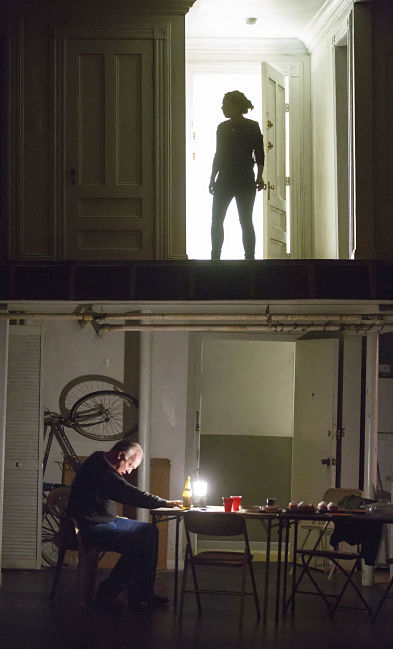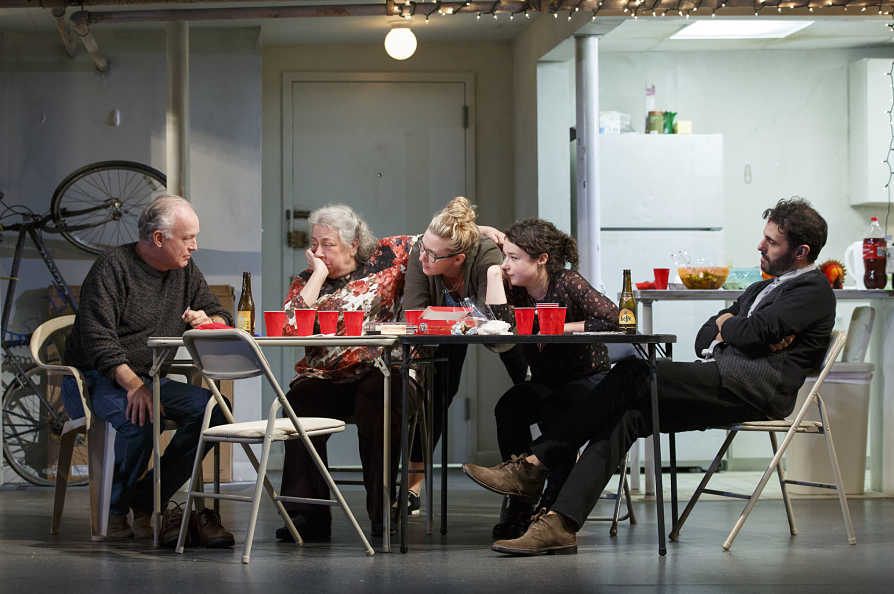When I first heard about Stephen Karam’s The Humans, billed as a play about a troubled family gathering over a Thanksgiving dinner, I asked him, “Is this your ‘big family play’”? His reply centered on the question of whether his six-character work—which bowed last fall at Chicago’s American Theater and is currently running Off-Broadway at Roundabout’s Laura Pels Theatre, with a Broadway move planned for the spring—was autobiographical or not. Not so much, he insisted, and besides, his actual family is “pretty big; I’d need supernumeraries to recreate a true Karam Thanksgiving.”
Of course, that wasn’t really what I was asking, but I understand why he demurred; my question essentially amounted to, “So are you officially entering the Great American Family Play sweepstakes alongside Long Day’s Journey, Death of a Salesman, Buried Child, Raisin in the Sun, August: Osage County et al.?” It was a fair question for the thirtysomething playwright, whose first major productions were set in a teen milieu—the school shooting-themed columbinus and the whip-smart metatheatrical inquiry Speech and Debate—and whose next play, the sneakily profound Sons of the Prophet, was a kind of coming-of-age, young-man-meets-world play which gestured at family mainly in its absence. (We published the full text of Sons in our Feb. 2012 issue; and The Humans is already out as a TCG book.)
Having seen the smashing new production at the Pels, I think I can report that my suspicions about The Humans were correct. Unfolding in real time over a single realistic set, and rifling with lightly worn confidence among the largest life-and-death themes you might care to not think about, The Humans marks a huge leap forward into that dramaturgical home on the range where the Millers and the Hansberrys roam (where very often is heard a discouraging word, and skies are frequently cloudy all day). It’s not just the play’s multigenerational cast, or its unflinching look into the abyss of death and despair, or its central focus on a clay-footed patriarch, embodied here with palpable anguish by arguably the nation’s greatest living stage actor, Reed Birney, that marks The Humans’ major-league ambitions.

No, the breakthrough represented by The Humans is as much about its formal aspects as its thematic concerns—about the way it uses the theatre as much as what is ostensibly on its mind. Its seeming veneer of bone-dry, real-time naturalism, enacted by a perfect cast on David Zinn’s stark two-story set of an unfurnished Chinatown apartment, barely conceals not only the usual reams of emotional subtext and shared backstory but an aching spiritual nakedness, as well. This is a family at a crossroads, sure, but they also feel like souls in transition; the unmoved-in apartment space feels distinctly purgatorial. The play’s eerie, edge-of-the-seat ending even hints in the direction of a kind of indeterminate, plausible magical realism—the kind where nothing actually inexplicable happens, but we’re certainly made to feel like something might at any moment.
In that as in many other respects, The Humans reminded me powerfully of Annie Baker’s recent John at Signature Theatre, also a breakthrough for her (if not into the family-play sweepstakes). That play, too, had a vast unit set (by Mimi Lien) that seemed to pin its characters in space; it, too, refracted its themes through contrasting generations, if not blood relations; and most significantly, John also grazed the territory of the supernatural without ever quite tipping its hand. In my experience, both productions encouraged a uniquely vigilant quiet among the audience, as we tried to puzzle out—what were those sounds, exactly? Did we see something move in that window?
But both plays intend to take us to that watchful state of shared, straining alertness not to spring cheap effects on us but to put us in touch with something more ephemeral and mysterious about our presence, our perception, and the passage of time—an exercise of attention and shared reflection I think theatre may be specially equipped to do. And it’s the kind of greatness that goes beyond “American” to just plain human.


